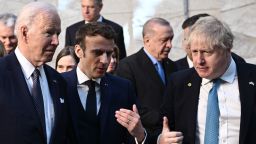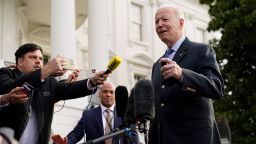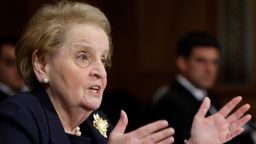President Joe Biden is in Europe to inaugurate the post-, post-Cold War era.
For the first time in at least 30 years, a US president has arrived with the continent rattled by Russian aggression and jarred by a return of nuclear brinkmanship. The West is also mourning its shattered illusion that it had entered an era of perpetual peace.
Biden’s visit to address NATO and European Union leaders in Brussels and his travel to Poland, an alliance frontline state, will underscore how the world changed – probably irrevocably – as soon as the first Russian tank rolled over Ukraine’s border four weeks ago.
For three decades since the fall of the Soviet Union, presidents have traveled to Europe and idealized the West’s victories over Nazism and Communism. Standing among the American dead in a D-Day World War II cemetery in Normandy or orating in an idyllic city square in Prague or Warsaw, US commanders-in-chief have often called transatlantic bonds unshakeable and forever.
Yet in recent years, it’s seemed like presidents and their audiences were going through the motions. The passing of the Greatest Generation severed the emotional twine of memory between Americans and Europeans over World War II. It’s been more than three decades since Europeans had to worry about fallout shelters, and people with strong memories of the Cold War are in middle age. European leaders cashed in their peace dividend on health care systems and neglected their militaries. And the United States looked to rising Asia and its next superpower rival, China.
A geopolitical wake-up call
Those unshakeable bonds – and the reason for them – didn’t seem so relevant, or necessary anymore, in the borderless Instagram age, especially as Russians, rarely seen enemies 40 years ago, now throng glitzy spots in London and Nice.
But Russian President Vladimir Putin, nurturing grievances seeded when he observed the fall of Communism from East Germany as a KGB officer and obsessed with reviving Russian greatness, changed all that. In the process, he reminded the West what it was for, shaking governments like Germany’s out of their post-Cold War complacency, and proved that the United States is still serious about the transatlantic alliance.
A new Iron Curtain has descended on Europe – this time a virtual one of economic sanctions that has severed air links, impounded oligarch cash and closed down Starbucks, Apple stores and Formula One races in Russia. NATO is rushing battle groups to frontline states like Hungary, Romania, Bulgaria and Slovakia. The alliance is locked in an sudden proxy war with Russia in Ukraine, funneling hundreds of anti-tank and anti-aircraft missiles to President Volodymyr Zelensky’s forces. Vicious civilian carnage and city-destroying barrages by Russia in Ukraine and the exodus of millions of refugees into Europe are, meanwhile, echoing the worst passages of the continent’s blood-soaked 20th century history.
Depending on your view, the West and Russia are now fighting the last struggle of the Cold War or the first in a new age of confrontation as autocracies like Moscow and Beijing form a broad hostile front against Western-style democracy.
“If Putin comes away from this aggression with some gains, then he’s likely to attempt this again – against Ukraine, against others, he’s likely to move ahead. So he needs to be absolutely defeated,” Jonatan Vseviov, secretary general of the Estonian Ministry of Foreign Affairs, told CNN in Washington on Wednesday.
Or as European Council President Charles Michel put it in an interview with CNN’s Christiane Amanpour: “We must make sure that Putin will be defeated. … This is a question of security, for the future of Europe and the future of the world.”
Biden’s visit is a historic turning point
This is why the current visit of an American President – still the ultimate guarantor of European security nearly 80 years after World War II – is so critical. Biden’s visit looks like its own pivot point in history. In this new era, the West will again try to deter and contain Russia as it seeks to bolster non-NATO member Ukraine’s fight for democracy and independence while avoiding a direct clash with Russia that could go nuclear.
This looks like the biggest strategic challenge facing the West at least as long as Putin is in power – no matter how the war in Ukraine eventually ends. And there is no guarantee that a post-Putin Russia would be any more sympathetic toward the West, especially if punishing sanctions further prejudice the power elite and ordinary Russians against America and Europe.
The extraordinary stakes mean Biden’s mission bears comparison with presidential trips that coincided with turning points in the Cold War. Those include President Ronald Reagan’s first meeting with the last Soviet leader, Mikhail Gorbachev, in Vienna in November 1985, which initiated a chain of events that eventually ended the Cold War. There were many critical presidential journeys to Europe throughout the showdown between the Soviets and the West. But Biden’s also deserves a mention in the same breath as the 1961 trip when President John Kennedy got a fearful dressing down in the Austrian capital from Soviet leader Nikita Khrushchev, which precipitated the Cuban Missile Crisis the next year – one of the closest moments the world came to nuclear Armageddon.
Fusing the unity of the alliance
Biden’s mission is not just rich in symbolism. It represents his best chance yet to fuse the unexpected unity of purpose in the alliance – that Putin clearly bet against – into a more permanent posture for confronting Russia in a war in Ukraine that has no clear off-ramps and could drag on for months. Biden and his European counterparts know that Putin will be on the alert for even the smallest signs of division on what to do next.
Yet tough negotiations loom on tightening sanctions – especially on the US desire to see key EU powers wean themselves from Russian energy sources on which they depend and that keep Western cash pouring into Moscow despite the most rigorous sanctions on record.
Biden left Washington on Wednesday warning that with Russia’s infantry advance bogged down, Putin could decide to use chemical weapons in Ukraine. Western nations will need to decide how they would respond to such an escalation – and whether there will be any change to the West’s determination not to confront Russia directly in Ukraine. Zelensky is, meanwhile, expected to make the latest of his highly effective calls for more help from the West as his country’s heroic resistance prompts Russian forces to rain ever more aerial bombardment on civilians.
Normally, international summits are scripted affairs that exist in high-security bubbles in which the rest of the world seems distant. But the constant pictures of civilian carnage in Ukraine and the mendacity of Putin’s assault on an independent, sovereign country will make this gathering different. The fear of how Putin will respond if he is cornered or desperate, especially given his nuclear saber rattling earlier in the crisis, will also concentrate the minds of the leaders.
History offered them a warning as they prepared to head to Brussels.
A 96-year-old Holocaust survivor, Borys Romanchenko, was killed on Friday in the Ukrainian city of Kharkiv. Romanchenko survived spells in Buchenwald, Peenemünde, Dora and Bergen-Belsen camps during World War II. But he couldn’t escape Putin’s monstrous barrage.
His death not only exposes the Russian leader’s cruel lie that he is waging a war to bring about the “denazification” of Ukraine; it puts Western leaders on notice that they are facing a full circle moment in Europe’s revived battle between tyranny and freedom.







